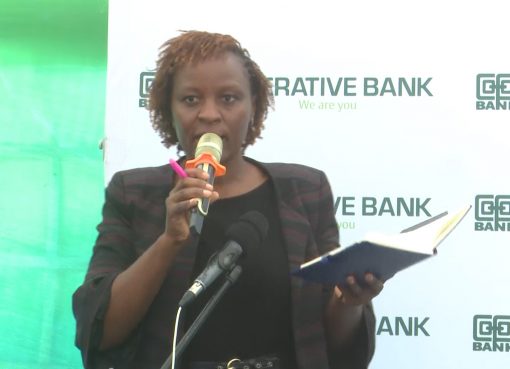Meet Flesia Wambui Kinyua a banana farmer who lives in Mukinduri area in Kerugoya, Kirinyaga County.
The 59-year-old has won key prizes for being a successful banana farmer in the area.
Wambui who is a mother of two ventured into banana farming in the year 2010.
Earlier on, she used to grow tomatoes and cabbages till she came to realise the hassle was becoming tedious compared to banana farming.
She says she is not quitting soon, having seen the benefits where her banana returns cater for all her bills including putting food on the table and educating her children.
“I attended several exhibitions and annual Agricultural Society of Kenya shows exhibiting different banana varieties. I immediately made up my mind and started growing bananas,” she reveals.
She started with only 100 plants which she bought from the Jomo Kenyatta University of Agriculture and Technology at a cost of between Sh100 and Sh120 each.
Later, she shared tissue culture banana farming ideas with several other farmers in her village who supported her thought and started Karinga Tissue Culture Banana Growers group that she chairs until now.
The group has since grown and has sixty active members who sell their produce every week through their umbrella organisation, Kirinyaga Banana Growers Association.
“Our buyers come from Nairobi and this season we are selling our produce to Twiga Foods who come for the bananas from our headquarters here in Kerugoya town.
She notes that all farmers pool their bananas together and sell as a group though the money is credited to individual farmers’ accounts according to their deliveries.
“The buyer does not give us cash money but credits the same to the bank where individual farmers use the payroll to access it from their bank accounts,” she explains.
She says those who wish to join the association as a group are required to register by paying Sh3, 000 as opposed to those who join as individuals paying out Sh2, 000 for the registration.
“For a farmer to qualify to register as an individual, one must own 700 banana stems.” she said.
She adds that the association had been instrumental in getting them market for their produce unlike in the past where middle men took advantage of them and often times disappeared with their money altogether.
“This time, we sign a contract with the buyer that binds both the buyer and the farmers being suppliers, thus saving us the agony of losing the money to unscrupulous traders,” she said.
Wambui says the county government had assisted in training of the farmer groups and in sourcing for markets.
This time she says plans were in place though at formative stages to assist the farmers in adding value to their produce through banana flour-making.
Wambui says Agricultural Sector Development Support Programme (ASDSP) is organising farmers to make sure their production is enough to sustain production of the flour when they finally start.
Currently, the group sells their bananas at Sh20 per kilo and with an average of 30 kilos per the stock, they are able to get Sh600 per sale on average.
She grows Grand 9, FIA 17 and Williams banana varieties that are high in demand and do well in the areas.
Her 18 months of waiting for the bananas to mature and be ready for harvest were worth it as most of them weighed at least 60 kgs and above in the first harvest.
“I was impressed and increased the number of stools to the current 1, 200 in my two acre land. I intend to add three more acres for banana farming,” she adds.
In September 2014, some officials from the ministry of agriculture visited her farm and told her that they were judging farms for consideration to exhibit at the ASK shows.
Her farm emerged the best not only in her sub-county but also in the country, where she won the small-scale farmer presidential award.
Wambui uses square banana farming technique where stools are grown in square pieces and grows them in a spacing of 9 by 9 feet.
“This spacing ensures that bananas get enough light triggering quality harvests. Space is not only the factor to be considered, we also apply 40 kgs of compost manure per stool annually,” she says, adding that during sunny days, they also use 40 litres of water per stool on weekly basis.
Wambui recently sold one tonne of bananas at Sh20 per kilo making a cool Sh20, 000.
Their group sells bananas on weekly basis. “We use banana leaves and stems to make compost manure for our farms but soon we will start making hats, wallets, trays and bags among other things subject to getting more money,” she says.
She says water was important in banana farming and that is why she drilled a borehole in her compound for farming.
Wambui says diseases like cigar end rot and pests like thrips affect bananas and their quality.
Christine Mwai, the Inoi ward agricultural extension field officer, advises that to maintain quality harvests, a farmer should keep pruning leaving at least four or five healthy plants in each hole.
The officer adds that the varieties of the bananas that Wambui grows are resistant to cigar end rot disease.
“Grand 9 and Williams are best in this area since they are not affected by cigar end rot disease.
Thrips causes silvery patches on fruits which later turns brown. This can be controlled by removing of male flowers and covering of bunches,” says Mwai.
Wambui says that besides being able to provide for her family, she has been able to create full-time employment for three people.
“One can lease land to grow bananas for at least seven years. Before end of this time, the farmer will have cultivated enough,” she advises.
By Irungu Mwangi


